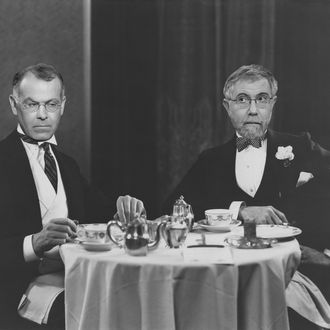
Paul Krugman’s column today is an extensive rebuttal to misguided commentators. “It has been disheartening to see some commentators still writing as if poverty were simply a matter of values, as if the poor just mysteriously make bad choices and all would be well if they adopted middle-class values,” he writes. What’s more, “And it’s also disheartening to see commentators still purveying another debunked myth, that we’ve spent vast sums fighting poverty to no avail (because of values, you see.)” And further still, “Shrugging your shoulders as you attribute it all to values is an act of malign neglect. The poor don’t need lectures on morality, they need more resources — which we can afford to provide — and better economic opportunities, which we can also afford to provide through everything from training and subsidies to higher minimum wages.”
Wait. Who are these unnamed commentators and shoulder-shruggers? Perhaps Krugman is referring to David Brooks, whose column last week attributed poverty to moral problems. Since the Times does not allow direct arguments, Krugman could not name or directly quote his debate opponent. (Annie Lowrey, not bound by any such restriction, provides a more thorough skewering of the nonsense statistic undergirding Brooks’s column.)
The passive-aggressive war between Krugman and Brooks has actually been heating up for some time now. Brooks wrote an April 17 column about personal character, a favorite theme of his. Ten days later, Krugman wrote a column about commentators who have been proven wrong about policy, a favorite theme of his. Krugman concluded, “there’s also a moral issue involved. Refusing to accept responsibility for past errors is a serious character flaw in one’s private life. It rises to the level of real wrongdoing when policies that affect millions of lives are at stake.” This dispute actually drives right to the heart of the ethos separating the two otherwise sociologically similar columnists. Does the character flaw lie (as Brooks sees it) in pointing out that you were right, or (as Krugman sees it) in denying you were wrong?
Tune in next week to see if the world’s longest argument nobody will admit is taking place continues.






























